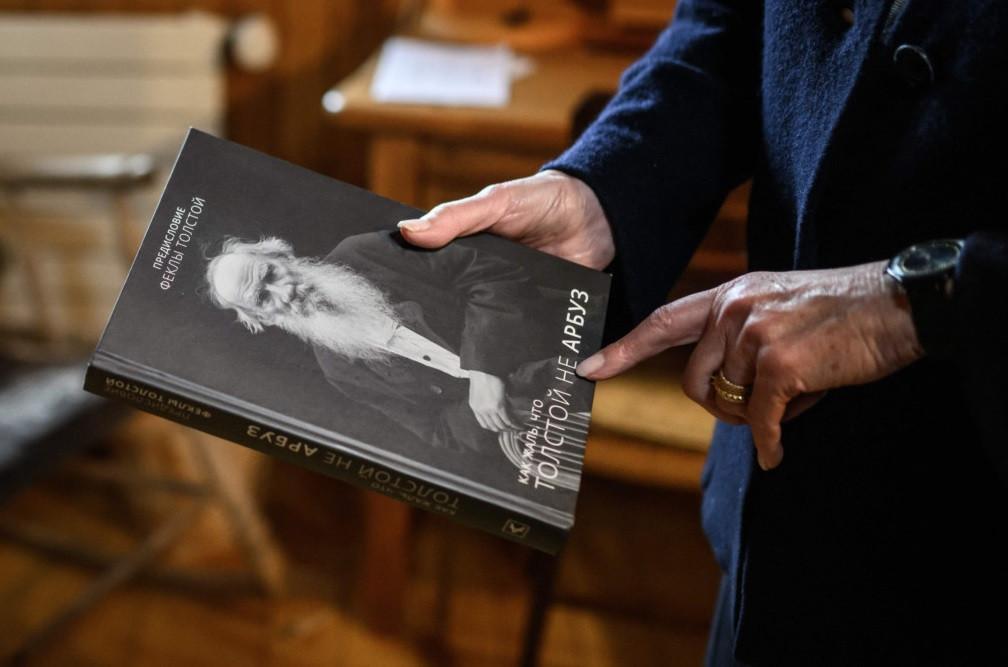
Under the intense gaze of Russian literary giant Leo Tolstoy, his great-granddaughter listens with concern as Anastasia Sheludko describes the horrors she experienced before fleeing Ukraine.
The invasion of Ukraine by her ancestral homeland Russia nearly six weeks ago had come as a massive shock, Marta Albertini told AFP, adding that she immediately realized she needed to help refugees.
“It was instinctive,” said the 84-year-old, who is lending Sheludko and her mother an apartment in the small village of Lens, near the plush Swiss Alps ski resort of Crans-Montana.
Before they arrived, Albertini removed most of the family pictures that covered the wooden walls of the apartment, but a large painting of her great-grandfather hangs in the living room.
The author of celebrated novels “War and Peace” and “Anna Karenina” would have viewed the conflict raging in Ukraine with “horror,” she said.
Albertini, who last year published a book about three generations of Tolstoy women -- her great-grandmother, who gave the author 13 children, her grandmother and her mother -- pointed out that he was a renowned pacifist.
Tolstoy, who experienced the Crimean War and the siege of Sevastopol in the 1850s, would likely have been “completely devastated” by what is happening, she said.
Albertini, who grew up in Italy and France before making Switzerland her permanent home a few years ago, says she is among many Tolstoy descendants who signed a letter to Russian President Vladimir Putin saying the family opposed the war.
“We are against the horrors that are being perpetrated now, the invasion of an innocent country,” she said, acknowledging that Putin had quite possibly looked at all the signatures “and thrown them in the trash.”
But it was important to speak up, she said. “Europe, the world, will not be the same after this war.”
For Sheludko, the world she knew just a few weeks ago has already evaporated.
“Sometimes I think I am dreaming,” she told AFP. “It is surreal.”
The 24-year-old arrived in the spectacular mountain landscape of Lens with her mother on March 13, more than a week after they fled their home in the southern Ukrainian city of Mykolaiv.
They are among more than 23,000 Ukrainians who have arrived in Switzerland, out of more than 4.2 million who have left the war-ravaged country since the Feb. 24 invasion.
Albertini, who lives in a traditional chalet outside Lens, had purchased the apartment in the village a few years ago for family visits, and with an eye to moving there herself once she no longer feels safe driving.
Through word-of-mouth, a local man working to bring in several Ukrainian families got in touch, and all was soon arranged.
Albertini was there when Sheludko and her mother arrived, along with another family that has since moved on.
That first meeting was “very, very emotional”, she said.
Now, more than two weeks later, Sheludko, wearing a grey sweatshirt and large-rimmed glasses, seems to have settled in, and is already attending university classes in the nearby town of Sierre.
She had been studying to be a translator in Mykolaiv, but here, she has reverted back to a study path she left a few years ago.
“So now I am an aspiring IT specialist again,” she said with a laugh.
But her smile fades as she recalls the moment when her “peaceful and normal life” changed.
“Just one morning you wake up because your airport got bombed at 5:00 am... and your life is never the same anymore.”
She and her family had cowered in a basement for 10 days before they saw the chance to drive west, leaving behind her older brother and grandparents.
Reaching Switzerland had been a huge relief, she said, adding that she was grateful for the “very nice, very warm” welcome.
Only later did she realise who her Russian-speaking host was.
Recalling that she had studied Tolstoy in school, Sheludko said being hosted by his descendant was “a great honour”.
Albertini stops her, insisting it is not a question of honour.
“I had this apartment, that allowed me to help. That’s all.”